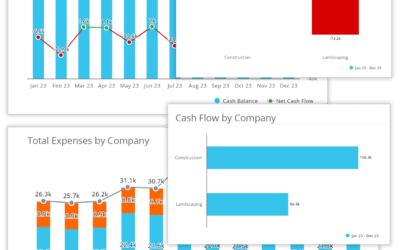
Budget, it’s not a four-letter word, but to some people, it may as well be. You work hard and spend hours gathering the expected and unexpected costs of running a business, then add in potential income, and finally create a budget. Then only to struggle (and most often fail) to adhere to it.
If this sounds like you, you are not alone. The big questions are these; Why is it so hard to stick to it? Why do most people/businesses spend all the time creating one, only to not follow it? And the most important question; What should we do differently to reach budgeting success?
Why is sticking to a budget so tricky?
When we narrow it down, there are three main reasons budgets can be difficult to follow;
- The daily or weekly tracking of expenses and deposits
- Making reasonable and necessary adjustments
- Accuracy in the numbers
Recognizing the problem is half the battle. So now we know where most of the issues arise from, so let’s do some work to solve the problem areas.
Start with a Better Budget
Identify Business Goals
The first place to begin is by identifying your business goals. When you know where you want to go, it is easier to know where to start and which direction to head. Check out this blog post if you need help setting some business goals. Goal setting is the most vital step in creating and sticking to a budget. Without a goal, there is no finish line. Goals can range from paying down debt, increasing cash flow, or adding more to your rainy day fund. Each business is unique, and so are your goals.
Review Past Documents
Next, take a look back at your documents, a profit and loss report, and income statement, bank statements, past tax returns, you get the idea. Don’t just guess what the numbers are, actually find them. Setting a budget with the wrong data is a waste of time and can lead down the wrong roads.
Be Realistic
Start with a realistic budget. Not a budget of what you “wish” or “hope” your business can reach. Go back and review past documents to discover the real and accurate numbers. When setting budget amounts, be conservative with your income amounts, this will help you save some for a rainy day. We have all heard the phrase “expect the unexpected.” So be sure and budget for it as well. It’s essential to be flexible as well; all the planning and budgeting can only go so far. Don’t be afraid to change things along the way.
Weekly Tracking
The best budget is one that has the correct and up to date information. Otherwise, it is useless information. By tracking your expenses and income regularly, your chances of having accurate, useful information increase significantly. In turn, reaching your business goals becomes more of a reality.
Tracking income and expenses each week will help you;
Pinpoint your spending habits – You will discover the good practices your business uses by tracking weekly. Then you can learn what is working and expand on it. You will also identify those pain point areas where spending is too high. Finding bad habits quickly before they get out of hand will save a massive headache later.
Pinpoint highest and lowest income sources – Finding out who, what, or where generates most of your income is highly valuable information. Is it a specific client or a particular product? This information will help you predict future income as well.
Create accurate numbers for future budgets – When you know your numbers are correct, and up to date, you can use them for your next year’s budget. It creates a baseline for income and expenses. Best of all, it saves a lot of work and time in the future.
Make adjustments along the way to avoid miscalculations – When you are continually updating and adjusting your budget, you are catching potential problems before they arise. Being flexible is part of working in a budget. No one’s budget is right on the numbers on the first try.
Get Help and Support from Others
As a business owner, the weight of sticking to a budget doesn’t fall solely on your shoulders. For success, get everyone on board!
It takes a village
Don’t be afraid to involve team members from the beginning stages of creating a budget. Including others creates a team feeling which will, in turn, encourage participation in sticking to the numbers. Getting input from different departments, managers will ensure proper budget amounts. They are on the front lines and can make or break a budget.
Find Outside Help
Sometimes hiring a professional bookkeeper or accountant is the best move for a business. If numbers are just not your thing, spending the money now for help may end up saving your business money and heartache in the long run. Support can include a person or an accounting/budgeting software.
The word budget doesn’t have to be a scary word. It can be the road map your business follows to create fantastic success! Use the start of 2020 to be your jumping-off point to develop and stick to a business budget.
Comment below with any secrets you have found to develop and stick with your budget.




0 Comments